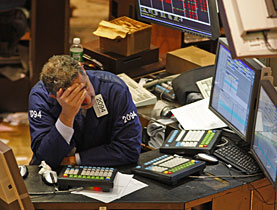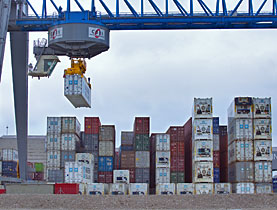Economy accelerates while inflation stays high

Switzerland's economy grew at twice the expected rate at the end of last year, driven by increased consumer spending and services exports.
The State Secretariat for Economic Affairs (Seco) in Bern reported on Tuesday that gross domestic product – the value of all goods and services – rose one per cent from the third quarter, twice the rate forecast by even the most optimistic of market analysts.
Seco added that Swiss economy grew by 3.1 per cent for the year as a whole.
This is slightly slower than the previous year but well above the country’s recent annual trend growth rate of below two per cent.
At the same time, Seco announced that inflation in February remained at 2.4 per cent, its highest level since 1993.
The economy grew 3.6 per cent in the fourth quarter compared with the comparable period in 2006, a statement from Seco said.
Swiss growth is expected to cool this year as a global slowdown weakens demand for exports and the United States housing crisis hurts earnings at Swiss banks including UBS and Credit Suisse.
Private consumption
According to the Zurich-based KOF Swiss Economic Institute, private consumption is expected to be the main driver of growth.
Analysts had mixed reaction to the GDP figures, but the general feeling was that the Swiss National Bank would not raise its key interest rate at its next meeting on March 13.
“It looks like Switzerland is still enjoying a boom,” said Jan Poser, chief economist at Bank Sarasin in Zurich.
“That’s the positive part of the story. But there are problems with the details. Inventories are expanding, consumption growth has halved and equipment investment was negative. That doesn’t bode well for the future.”
Economist Fabian Heller at Credit Suisse said the Seco figures were a “positive surprise once again”.
Risks
“The annual growth rate is far above expectations. This points to some upside risks in the first quarter…
“We stick to our 2008 forecast of 1.9 per cent growth… The figures taken at face value would call for higher rates. But given the current situation we expect unchanged rates throughout the year,” Heller commented.
A vice-president of the SNB, Phillip Hildebrand told a conference in London on Monday that the credit crisis, triggered by the collapse of the US subprime housing market, showed little sign of abating and may be entering a new, more dangerous phase.
“There are many indications to suggest that we are not yet out of the woods,” he said.
swissinfo with agencies
GDP grew by 1% in the fourth quarter of 2007, its fastest rate in more than two years.
Economists polled separately by Reuters and Bloomberg had expected growth to slow to 0.5%.
Inflation remained at 2.4% in February, a 14-year high.
The leading growth barometer of the KOF Swiss Economic Institute fell to a two-year low in February, dropping to 1.65 points.
The indicator still shows that economic growth will remain robust this year, supported by consumption as exports slow.
KOF expects economic growth of 2.1% this year, while the Swiss National Bank has put forward a figure of around 2%.
With real economic growth of 3.1%, Switzerland outperformed the European Union, the United States and Japan in 2007.
The European statistics office, Eurostat, has forecast an average GDP growth of 2.9 per cent for the EU’s 27 member states.
Growth of the US economy was 2.2%, while Japan has reported an increase of 2.1%.

In compliance with the JTI standards
More: SWI swissinfo.ch certified by the Journalism Trust Initiative











You can find an overview of ongoing debates with our journalists here . Please join us!
If you want to start a conversation about a topic raised in this article or want to report factual errors, email us at english@swissinfo.ch.